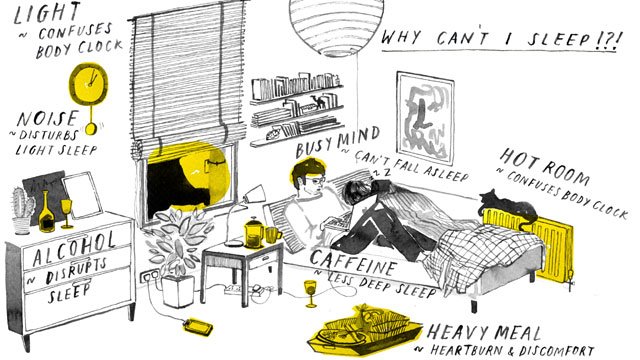
It seems as though simply being tired would lead to a good night’s rest. Unfortunately, there are a number of factors that may prevent you from getting the rest you need. Often times, not much consideration is given to designing a bedroom. A typical plan involves little more than the color of paint, size of bed, and where to put at TV. However, this classic setup may be preventing you from getting the best rest possible. Read below to learn about ways to optimize your sleep environment.
Is Your Bedroom Quiet?
Most people do not need to be reminded that a quiet environment for sleep is ideal. Sadly, this is not always the case. If you find your bedroom faces a busy street, loud equipment, or any other nuisance, more noise may be the solution. White noise, that is. This is basically background noise that, in this case, will serve to drown out other more disturbing sounds. A ceiling or free standing fan is sometimes all that is needed to accomplish this. If it is not a time of the year that warrants fan use, try playing sounds you find soothing from a phone or iPod, for example, light rain may work.
Control Your Temperature
The optimal temperature for sleep is around 65 degrees Fahrenheit. Rather than cranking the air conditioning, you may be able to achieve this temperature by using a fan or opening a window. This is on the cooler side for those winter months, so an extra blanket or new pajamas may further help you sleep comfortably.
Test Your Bed.
Is it time for a new mattress? If so, put some extra thought into which one works best for you. Ask an expert. Spend some time testing it at the store. If you sleep with a loved one, have them come along for the test drive.
Limit Distractions.
Your bed should be strictly for sleep and sex. The more you allow in your bedroom, the more there is to distract you from sleep.
Limit Screen Time.
It is best not to have a TV in the bedroom, but if you do, unplug it after 7pm. Limit use of cellphones, tablets, and other devices in bed as their screen provide stimulation that can keep you tossing and turning.
Make Time for Natural Light.
Natural light is helpful to establish our biological clock. Make sure to maximize it by getting outside, even for a minute, while at work. If this isn’t possible, spend some time in front of a nice window. During those dark winter days, try a sleep/wake light. These are relatively inexpensive and can be set to progressively increase in intensity to mimic a natural sunrise, helping to gently wake you from slumber.
Try these tips to make sure your bedroom is optimized for rest!
If you like reading about Dr. Dugarte’s healthy lifestyle articles you will certainly love hearing from him email tips just for you. Subscribe to our seven-day Sleep Improvement course here!